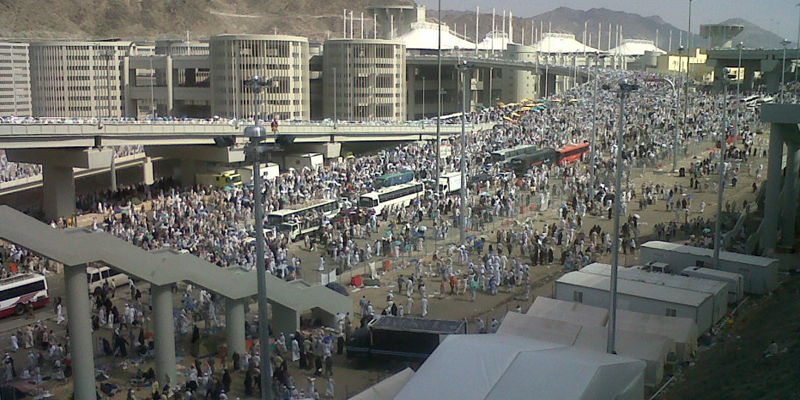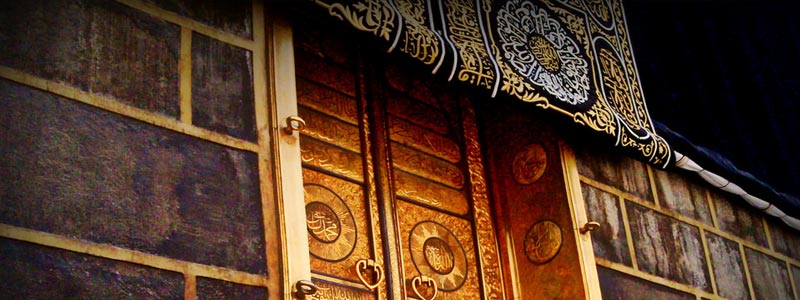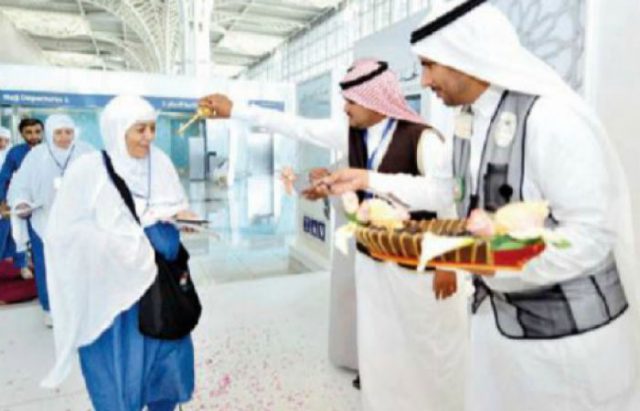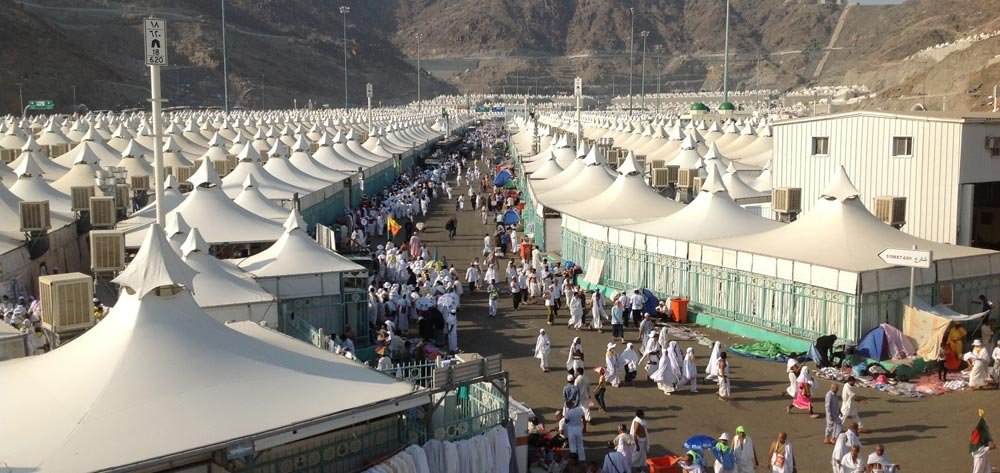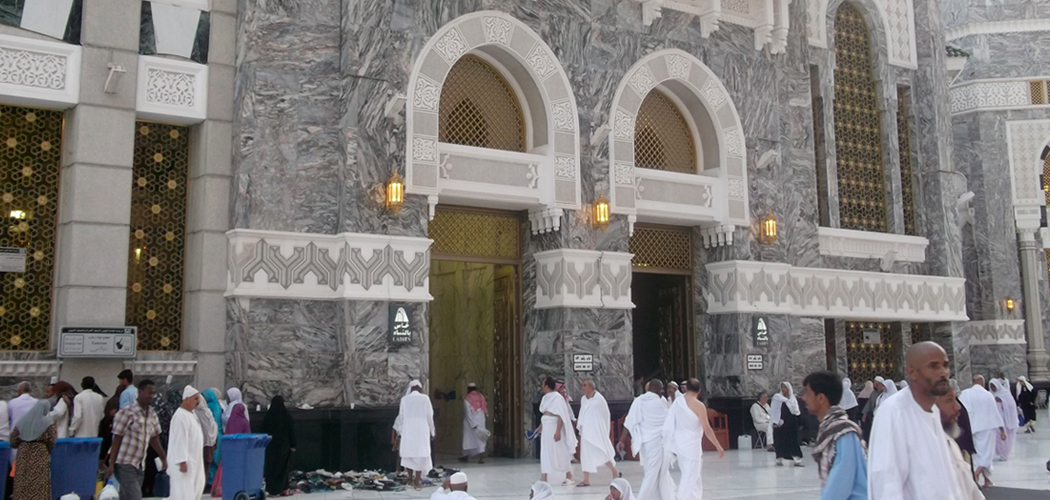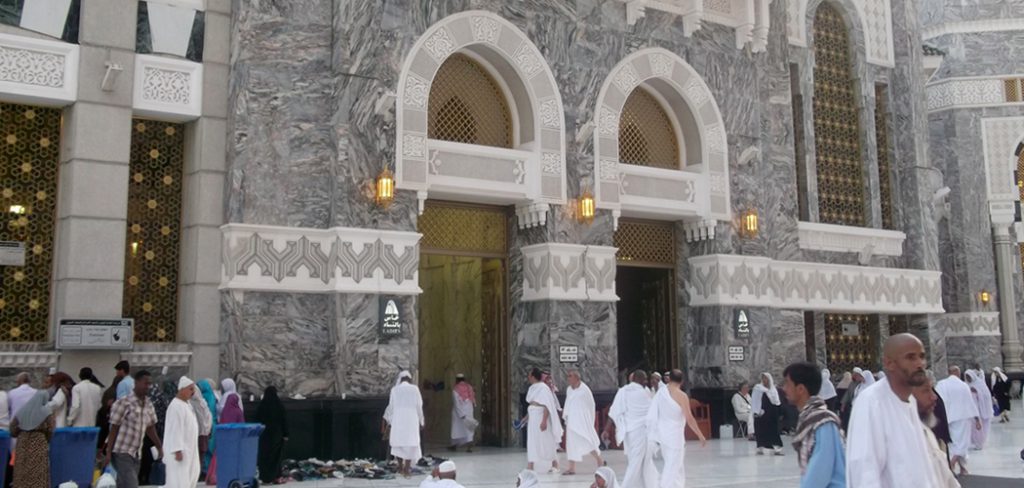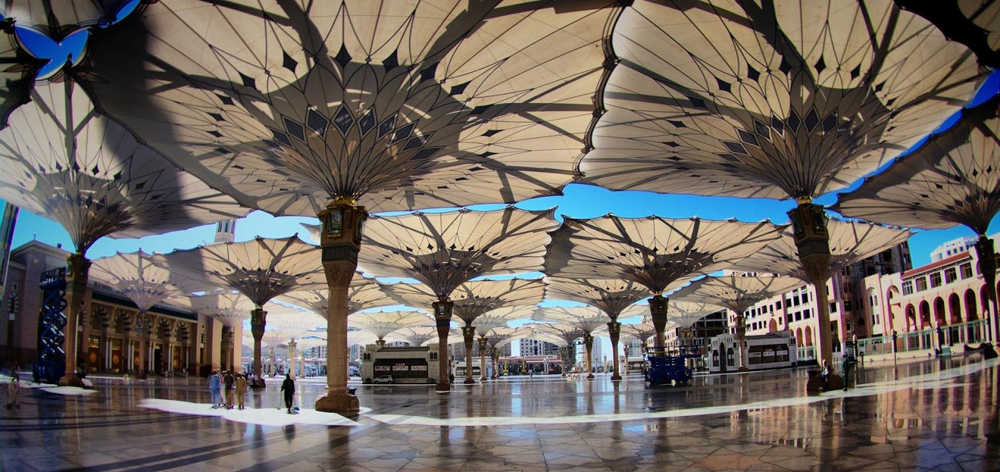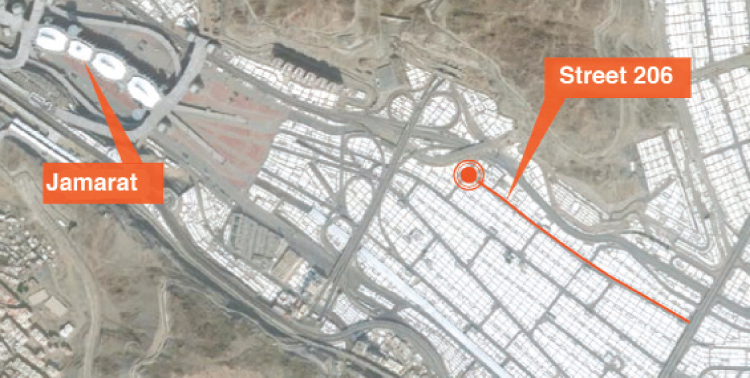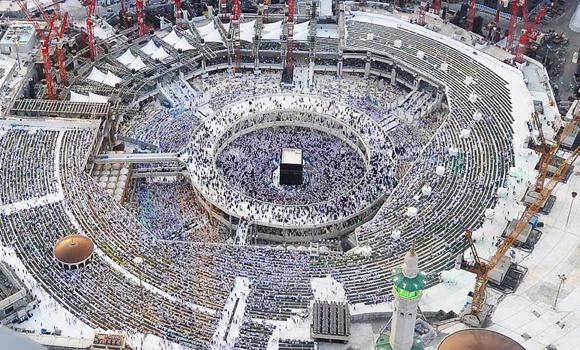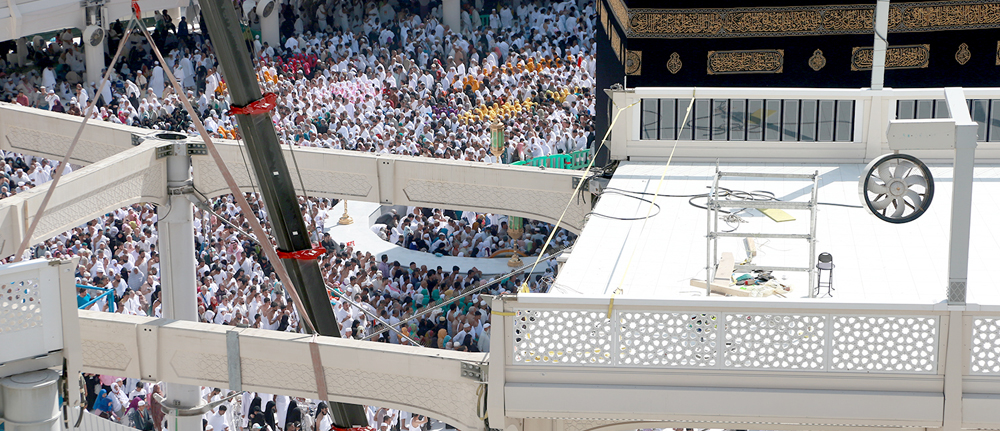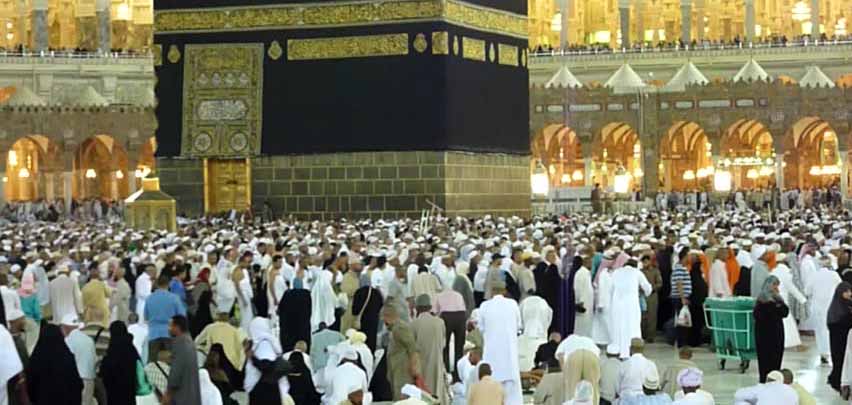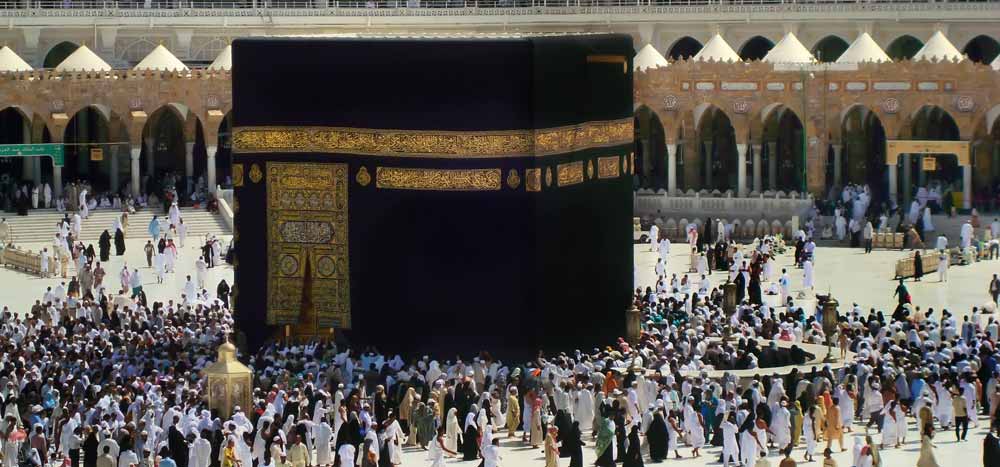Islam has two major religious celebrations. The first occurs after the completion of Ramadan, the Islamic month during which Muslims (believers in Islam) fast daily from dawn to sunset as part of an effort towards self-purification and betterment. This holiday is known as Eid ul-Fitr (Festival of Breaking the Fast).
The second major Islamic celebration takes place during the time of the Hajj, or annual pilgrimage to Makkah (Mecca). This week-long event occurs two months and ten days after Ramadan ends, during the Islamic month of DhulHijjah, and its culmination is a holiday known as Eid ul-Adha (Festival of Sacrifice). The Hajj consists of several ceremonies, meant to symbolize the essential concepts of the Islamic faith, and to commemorate the trials of prophet Abraham and his family. Over two million Muslims perform the pilgrimage annually, and the rest of the over one billion Muslims worldwide celebrate the Eid holiday in conjunction with the Hajj.
In order to teach about the important holidays of Islam, teachers can photocopy the “Information for Students” pages of this packet and distribute them to their students. After providing 15-20 minutes to read the pages, teachers can use the provided questions to guide discussion and elicit responses from the students. Some suggested activities for students are also included in this packet.
ABRAHAM
Abraham is a figure revered by Muslims, Jews, and Christians alike as a righteous person who lived over four thousand years ago. His story can be found in the Bible as well as the Qur’an (the Muslim holy book). Abraham is considered to be the patriach of monotheism, or “belief in the One God,” who sought a personal relationship with his Creator. He left his native city of Ur in Mesopotamia after voicing opposition to his people’s polytheistic practices,and eventually settled in Egypt with his family. Later, he escorted one of his wives, Hajar, and their infant son IIshmael to a desolate valley in Arabia and left them there, trusting in God’s promise to care for them.
Hajar, concerned about feeding her young baby, began searching the surroundings for food and water. According to the Qur’an, in response to Hajar’s prayers, a spring miraculously gushed forth at Ishma’il’s feet to quench their thirst. Hajar climbed nearby hills searching for food and looking for caravans on the horizon. Eventually, some passing traders stopped in the valley, and asked Hajar’s permission to water their camels. In time, the traders decided to settle in the little valley, and eventually, the settlement grew into the city of Makkah. Abraham returned from time to time to visit, and when Ishma’il was about thirteen years old, he and Ishma’il constructed the Katbah, an empty cube-shaped building, as a place dedicated for the worship of the One God. Eventually, Makkah became an important trading post by the time of Prophet Muhammad, twenty- five hundred years later.
THE HAJJ
In commemoration of the trials of Abraham and his family in Makkah, which included Abraham’s willingness to sacrifice his son in response to God’s command, Muslims make a pilgrimage to the sacred city at least once in their lifetime. The Hajj is one of the “five pillars” of Islam, and thus an essential part of Muslims’ faith and practice. Muslims from all over the world, including the US, travel to Makkah (in modern- day Saudi Arabia). Before arriving in the holy city, Muslims enter a state of consecration (dedication) known as ihram, by removing their worldly dothes and donning the humble attire of pilgrimstwo seamless white sheets for men, and simple white dresses and scarves for women. The white garments are symbolic of human equality and unity before God, since all the pilgrims are dressed similarly. Money and status no longer are a factor for the pilgrims – the equality of each person in the eyes of God becomes paramount.
Upon arriving in Makkah, pilgrims perform the initial tawaf, which is a circular, counter- clockwise procession around the Ka’bah. All the while, they state “Labbayka Allahumma Labbayk,” which means “Here I am at your service, O God, Here I am!” The tawaf is meant to awaken each Muslim’s consciousness that God is the center of their reality and the source of all meaning in life, and that each person’s higher self-identity derives from being part of the community of Muslim believers, known as the ummah. Pilgrims also perform the sa’i, which is hurrying seven times between the small hills named Safa and Marwah, reenacting the Biblical and Qurtanic story of Hajar’s desperate search for lifegiving water and food.
Next, on the first official day of Hajj (8th of Dhul-Hijjah), the two million pilgrims travel a few miles to the plain of Mina and camp there. From Mina, pilgrims travel the following morning to the plain of Arafat where they spend the entire day in earnest supplication and devotion. That evening, the pilgrims move and camp at Muzdalifa, which is a site between Mina and Arafat. Muslims stay overnight and offer various prayers there.
Then the pilgrims return to Mina on the 10th, and throw seven pebbles at a stone pillar that represents the devil. This symbolizes Abraham’s throwing stones at Satan when he tried to dissuade Abraham from sacrificing his son. Then the pilgrims sacrifice a sheep, reenacting the story of Abraham,who, in place of his son, sacrificed a sheep that God had provided as a substitute. The meat from the slaughtered sheep is distributed for consumption to family, friends, and poor and needy people in the community. After the sacrifice, the pilgrims return to Makkah to end the formal rites of Hajj by performing a final tawaf and sa’i.
Muslims believe the rites of the Hajj were designed by God and taught through prophet Muhammad. Muslims believe that since the time of Adam, there have been thousands of prophets, including such well-known figures as Noah, Abraham, Moses, Jesus, and David, and that Muhammad was the final prophet of God.
The Hajj is designed to develop God consciousness and a sense of spiritual upliftment. It is also believed to be an opportunity to seek forgiveness of sins accumulated thoughout life. Prophet Muhammad had said that a person who performs Hajj properly “will return as a newly born baby [free of all sins].” The pilgrimage also enables Muslims from all around the world, of different colors, languages, races, and ethnicities, to come together in a spirit of universal brotherhood and sisterhood to worship the One God together.
EID-UL-ADHA
Although only the pilgrims in Makkah can participate in the Hajj fully, all the other Muslims in the world join with them by celebrating the Eid ul Adha [eed ul ud-ha], or Festival of Sacrifice. On the 10th of Dhul-Hijjah, Muslims around the world wear their nicest clothing and attend a special prayer gathering in the morning. This is followed by a short sermon, after which everyone stands up to hug and greet one another. The traditional Eid greeting is “Eid Mubarak,” which means “Holiday Blessings.” Next, people visit each other’s homes and partake in festive meals with special dishes, beverages, and desserts. Children receive gifts and sweets on this joyous occasion. In addition, like the pilgrims in Makkah, those Muslims who can afford to do so offer domestic animals, usually sheep, as a symbol of Abraham’s sacrifice. The meat is distributed for consumption to family, friends, and to the poor and needy.
The Eid ul-Adha is a major religious event in the lives of Muslims. Usually, communities celebrate tnis occasion over a period of several days.
British haj travel announced 3,4 and 5 star hajj Packages visit our website & select your golden hajj packages
Umrah Packages | Hajj Packages | Ramadan Umrah Packages | December Umrah Packages
Source: islamicity.org
